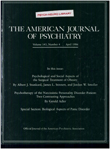Steroid-sensitive dementia
Abstract
Occasional patients with senile or presenile dementia respond favorably to steroid therapy. In addition to endocrinopathy and increased intracranial pressure, inflammatory processes and vasculitides can cause dementia and be sensitive to steroids. The author reports four such cases. A brain biopsy can be of great value for definitive diagnosis; it should be considered particularly in unusual, fulminant, and unexplained cases of dementia. A trial course of several weeks of steroid therapy can be given for such cases, but steroids should not be continued if improvement is not clearly apparent.
Access content
To read the fulltext, please use one of the options below to sign in or purchase access.- Personal login
- Institutional Login
- Sign in via OpenAthens
- Register for access
-
Please login/register if you wish to pair your device and check access availability.
Not a subscriber?
PsychiatryOnline subscription options offer access to the DSM-5 library, books, journals, CME, and patient resources. This all-in-one virtual library provides psychiatrists and mental health professionals with key resources for diagnosis, treatment, research, and professional development.
Need more help? PsychiatryOnline Customer Service may be reached by emailing [email protected] or by calling 800-368-5777 (in the U.S.) or 703-907-7322 (outside the U.S.).



